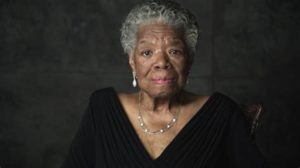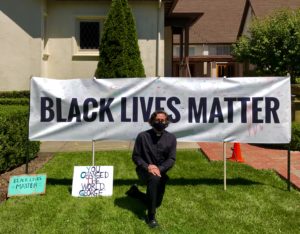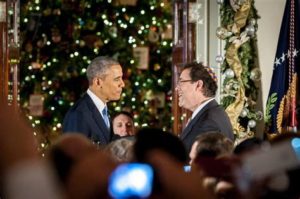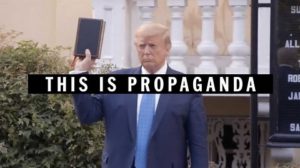As a high school freshman many years ago, I took a course titled “The Bible as Literature.” It wasn’t exactly in the spirit of that freewheeling era. At a time when many of us were listening to the Grateful Dead and wearing our Birkenstock sandals with rainbow socks, we were also studying the Book of Job and the Song of Solomon.

Maya Angelou, who wove the rhythm and imagery of the Bible into her writing
Yet, what I learned in that class managed to permanently lodge itself in my foggy adolescent brain – something I can’t say for most of what I studied in high school or college. It taught me that much of the world that I live in is informed by those ancient stories, with a power and resonance that seems to move us on a subconscious level. Bob Dylan’s lyrics taps into this, as does Margaret Atwood’s The Handmaid’s Tale and Maya Angelou’s poetry. The lesson was that the Bible provides the narrative architecture of the Judeo-Christian world, even during this secular age when many of us are not church goers.
Which brings me to President Trump’s photo-op in front of St. John’s Church in Washington, D.C. on the evening of June 1st. Federal police in full riot gear fired gas canisters and rubber bullets to clear away peaceful protestors and clergy members handing out water bottles on the steps of the church, making way for the President and his entourage. Trump held up a Bible long enough for the photo shoot, without reflecting on its words or meaning, and without expressing any sorrow over the police killing of George Floyd, who himself was involved in Christian ministry for many years. It was an offensive political stunt which debased the Bible and one of America’s most historic churches.
As a group of New England Episcopal Bishops wrote on June 2nd, “Our church may rightly feel outraged and insulted by having the symbols of our faith used as a set prop in a cynical political drama. The real abomination before us, however, is the continued oppression of and violence against people of color in this nation.” As a mainline Protestant denomination that, historically, often helped support establishment injustice, I am glad Episcopalian leaders are speaking out – first and foremost – against racism and police violence against black people. Under Presiding Bishop Michael Curry, who is black, the church is forging a leadership position on social justice. Mariann Edgar Budde, the bishop of the Episcopal Diocese of Washington, wrote eloquently about what she called this “crucible moment.” “Let’s keep our eye on the prize, which is racial justice,” said the Rev. Chris Rankin-Williams at St. John’s Episcopal Church in my hometown of Ross, Ca. told the local paper. He and many other faith leaders in our community spoke out against Trump’s propaganda and in support of racial justice.

Rev. Chris Rankin-Williams at St. John’s Episcopal Church in Ross, Ca
Leaders of the high school I attended, Chris Mazzola, and its board chair Claudia Lewis of the Branson School, have also spoken in support of the protestors and the black lives matter movement. You can read their full statement here. That is a welcome change from the school’s stance towards systemic racism, which was not acknowledged when I attended. Compared to the 1970s, today’s Branson students are more aware of their privilege and the school is making a far greater effort towards inclusion and diversity.
Two remarkable faith leaders working for social change came out of my high school in the 1960s and 1970s. One is the Rabbi Bradley Shavit Artson, who holds a Dean’s Chair at the Ziegler School of Rabbinic Studies at the American Jewish University in Los Angeles, California. The other is the Rev. Sally Grover Bingham, an Episcopal priest in San Francisco and a prominent climate activist. Sally took a similar “Bible as Literature” class in college and seminary, and Brad did as well. Both of our sons also took a “Bib Lit” class from the Urban School of San Francisco’s late English and History teacher, Dan Murphy.

President Obama and Rabbi Bradley Artson
You can listen to a conversation between Rabbi Artson and the Rev. Bingham here that took place as part of Branson’s Centennial celebrations. We are connected through ancient traditions and stories, as well as our privilege of having attended a high school that is now acknowledging a need to take action against injustice, discrimination, and inequity. I’m also deeply grateful for having gone to a school which urged us to begin exploring the meaning and beautiful language of the Bible, all those years ago, and for all those working towards racial justice.

 Rev. Sally Bingham says
Rev. Sally Bingham says
June 4, 2020 at 5:00 pmThis is a beautifully written essay expressing the concerns and opinions of many. St. John’s Episcopal church in Ross is where I was confirmed and where the seeds of justice, love and peace were integrated into my heart and mind. Today I practice those values as often as necessary. Trump’s intrusion into deeply rooted Christian values was and still is profoundly disturbing.
 Judy Valentine says
Judy Valentine says
June 5, 2020 at 12:25 amHaving watched the Floyd family put to rest their murdered son, George, today, one could not help but contrast true religiosity with the false, cynical variety of the President. Like you, Julie, I, too, had a profound initiation into Bible study and religion, although mine was in grade school. We can only wish that our leaders were so educated. It might have helped. Thank you for sharing your piece. I liked it very much.
 Rabbi Bradley Shavit Artson says
Rabbi Bradley Shavit Artson says
June 7, 2020 at 1:52 pmThis is such a wise and powerful reflection! Thank you Julie for your insights and affirmations. Can we celebrate how far we have come from the 70s, mourn the injustices that remain, while renewing our commitment to lean in to how much more needs to be done? The vision of the Hebrew Prophets (My house shall be a house for all peoples!”) continues to call us all!